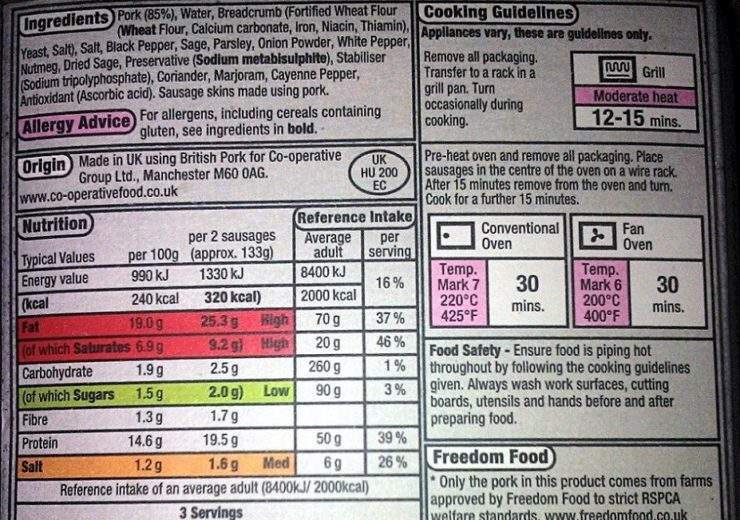Proposals for new food labelling laws in the UK to help people with allergens follow the Pret A Manger death of Natasha Ednan-Laperouse

The UK is proposing a change in its food labelling, in regards to allergen rules
The issue of food labelling guides has been a hot topic since a teenager’s tragic death after eating a Pret A Manger baguette – and now change is upon us.
The UK government has proposed four potential changes to labelling laws for food that is produced, packaged and sold in-store.
This would include deli meals such as sandwiches and salads, which are not required to carry labels unless they have been produced and delivered to the store by a third party.
Any changes to the law would be designed to protect people with allergens and come after the death of Natasha Ednan-Laperouse.

The 15-year-old Londoner suffered an allergic reaction to sesame – an ingredient that was not labelled – after eating a Pret a Manger baguette at Stansted Airport in 2016.
What does the government say about proposed changes to the food labelling guide?
UK Environment Secretary Michael Gove said: “We want to ensure that labels are clearer and that the rules for businesses are more consistent so that allergy sufferers in this country can have confidence in the safety of their food.
“Many businesses are already bringing changes on board independently, and in the meantime, they should continue doing all they can to give consumers the information they need.”

The issue of food labelling is often cited as an issue by customers, with 42% of Brits with allergies, intolerances or lifestyle diets naming poor labelling as the second most common reason for buying the wrong product in a survey by food search engine Spoon Guru.
As the government goes to consultation on its changes to food labelling guides, we look at the current rules and what the proposed changes are.
Food labelling guide in the UK: Current regulations
What are food allergens?
There are 14 food allergens that companies are required to mention. These are:
- Celery
- Cereals containing gluten – including wheat, rye, barley and oats
- Crustaceans – such as prawns, crabs and lobsters
- Eggs
- Fish
- Lupin (plant)
- Milk
- Molluscs – such as mussels and oysters
- Mustard
- Tree nuts – including almonds, hazelnuts, walnuts, Brazil nuts, cashews, pecans, pistachios and macadamia nuts
- Peanuts

Peanuts are one of the 14 allergenic products that are required to be highlighted if featured in a product - Sesame seeds
- Soybeans
- Sulphur dioxide and sulphites
Differences between pre-packed and non-prepacked foods
Whether or not catering companies need to label these allergens depends on whether or not their food is pre-packed.
Pre-packed foods include products that are wholly or partly enclosed by the packaging, those that can’t be altered without opening or changing the packaging, and are ready for sale.
These typically involve the production of anything from sweets to ready meals sold in supermarkets.
Any products that fit within this definition must highlight allergenic content within a full list of ingredients.
Food can also be pre-packed for direct sale having been prepared on the premises, such as convenience retailers like Pret a Manger and Greggs, or non-prepacked as consumers will often find in small cafes and pubs – where food is sold loose.
Under these two definitions, non-prepacked regulations apply and businesses must provide allergen information in writing either:
- By issuing full allergen information on a menu or chalkboard
- In an information pack or a written notice placed in a clearly visible position explaining how customers can obtain this information.
Staff should also be provided with allergen training, and the government “highly recommends” – but does not legally require – that employees:
- Know the procedures and policies when asked to provide allergen information
- Get training on handling allergy information requests
- Be able to guarantee that allergen-free meals are served to the right customers
- Know the risks of allergen cross-contamination when handling and preparing foods and how to prevent this.
Food labelling guide in the UK: Proposed changes
Four options have been put forward by the Department for Environment, Food and Rural Affairs for a new food labelling guide.
While this would have no impact for pre-packed and non-prepacked food retailers, it would affect those in the middle – the companies using pre-packed for direct sale, like Pret.
The proposals under consideration include a choice of:
- Full ingredient list labelling
- Allergen-only labelling
- Ask-the-staff labels with supporting information for consumers in writing
- Promoting best practice around communicating allergen information to customers
Allergy UK comments on changes to food labelling guides
Food charity Allergy UK has welcomed the consultation.
In a statement, it said: “We believe that whilst those living with allergies must be vigilant on their own behalf, the broader food industry needs to do more than just the bare minimum when it comes to catering for the allergic community.
“We encourage all those living with allergies to engage with this consultation to ensure their views on this important issue are heard.”
The organisation said about ten people die every year from food-induced anaphylaxis, while there are also about 1,500 asthma deaths – some of which might be triggered by food allergy.
“For those at greatest risk, the tiniest trace of food allergen can trigger severe symptoms and, in some cases, cause fatal or near-fatal symptoms,” it said.
